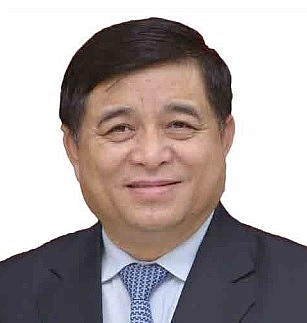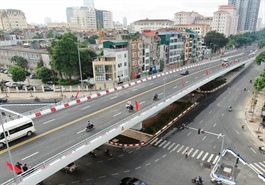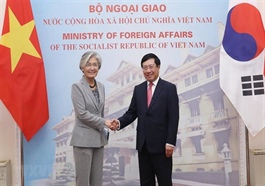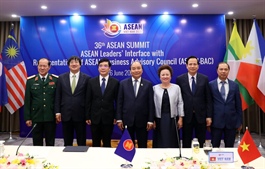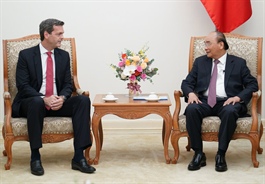MPI highlights value of speedy disbursements
MPI highlights value of speedy disbursements
With a tumultuous 2020 slowly nearing its end, the Ministry of Planning and Investment is engaging in pushing all national administrative agencies to speed up disbursement of capital to support the country’s goal of reaching satisfying economic growth, despite the pandemic’s impacts.
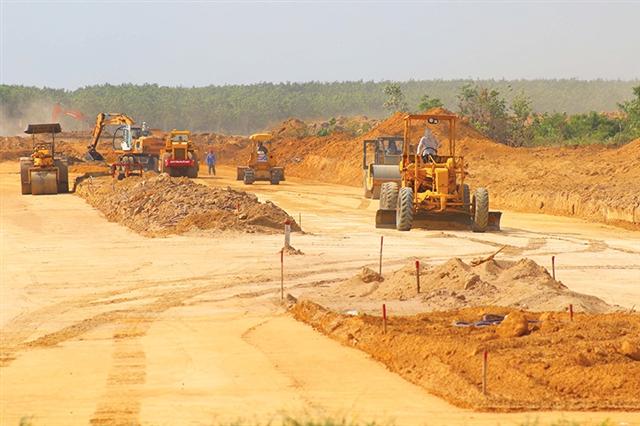
Disbursement of public investment capital is especially crucial for infrastructure projects to boost economic growth, photo Le Toan
|
In its latest report, the Ministry of Planning and Investment (MPI) emphasised the importance of promoting public investment during the last months of the year to reach the country’s economic growth target of at least 2 per cent.
With a faster disbursement of public funding, Vietnam could even reach a GDP growth of 2.5 per cent for 2020. However, as Prime Minister Nguyen Xuan Phuc stated at the government’s cabinet meeting in August, capital for many projects currently in high demand is only being disbursed slowly. Therefore, the PM urged the MPI to find solutions to reach the nation’s growth targets.
Vietnam is determined to disburse the entirety of its planned capital of VND630 trillion ($27.4 billion) to remedy the economic aftermath of 2020 and prepare its economy for a near-full recovery in 2021 with an expected growth rate of 6.7 per cent. Unfortunately, data from the Ministry of Finance leaves little hope of these goals being reached.
|
Nguyen Chi Dung - Minister of Planning and Investment
In 2021, Vietnam’s economy may still face many challenges. Although the pandemic shows signs of easing, many potential risks remain unpredictable and might even last well until the end of next year. Similarly, the global economic outlook is equally difficult to forecast, with many major economies suffering under recessions. Though they may be able to recover in the short term, a full recovery to the levels before the health crisis could take from two to four years, depending on its impact. However, Vietnam set the growth target at 6.7 per cent for 2021, with the overall goal of focusing on restoring the economy, promoting rapid and sustainable growth, and ensuring macroeconomic stability, in line with the country’s Sustainable Development Goals for 2030. Therefore, the MPI proposed 23 main targets – 11 more than in the previous 5-year period – to ensure a closer cohesion between the annual and 5-year plans for the 2021-2025 period. |
As of July 31, only 12 ministries and central agencies and 38 localities could showcase disbursement rates over 35 per cent. Meanwhile, 24 administrative agencies had rates below 25 per cent, and another 10 even below 10 per cent.
The problems related to these numbers are manifold and include low disbursements and high costs, sometimes starting at a project’s formulation. Many agencies have failed in their management and leadership role when preparing projects to apply for capital, which leads to the state being the sole bearer of all costs.
Slow disbursements are the responsibility of those who propose and receive capital, and their fear of the related accountability and risks often leads to stagnation in the process of disbursing capital for already planned projects.
However, the government’s announcement of capital transfer for slow-disbursing units shows the importance of public investment to the economy. Dinh Van Dien, Chairman of Ninh Binh People’s Committee, pledged to continue speeding up the province’s usage of public investment and even receive additional capital from elsewhere.
According to the MPI’s National Portal on Monitoring and Evaluating Investment, Ninh Binh has always been among the top 10 localities with high disbursement rates. As of July, the province made use of over VND2.1 trillion ($91 million), equal to around 71 per cent of its investment plan.
However, in regards to Ninh Binh, Dr. Dinh Trong Thinh from the Academy of Finance remarked, “Though capital transfer is one possible solution, it is not a very popular one. Many difficulties relating to the actual transfer process and a project’s succeeding completion dampen this approach.”
Nevertheless, up until now capital transfer has been the solution for projects with either slow or outstanding disbursements. Such funds can be transferred between projects under the same administrative unit or even be poured into other national ones. “However, managing units will not easily agree to transfer their unused capital to other projects after they spent a lot of time and effort to receive this in the first place,” Thinh added.
“Until now, the government has not published decisions on what disbursement rates must be achieved for a managing unit to keep its assigned project capital, which “may prolong the transfer process as there are also no sanctions,” he said.
According to Thinh, it would be better for the MPI to “petition the government to approve the transfer of public investment capital from slow proceeding projects to those which have the ability to deliver better results.”
The phenomenon of sluggish disbursements of public investments is nothing new and even happened back in the 1980s, when Vietnam relied on financial support from other socialist countries. However, its impact was not as strong as it is now, simply because those funds were not as large as the current ones. Moreover, public investment plans were carefully crafted and saw the united efforts of all government agencies.
As a silver lining, the Ministry of Transport will complete the disbursement of its entire budget, with more than VND33 trillion ($1.4 billion) of domestic capital and another VND40 trillion ($1.7 billion) of foreign loans, as its Minister Nguyen Van The announced at the prime minister’s conference on the development of the Central Highlands and Central Vietnam in July.
However, the minister said that to achieve this goal, the ministry would need full support with outstanding site clearances, especially those for key projects like Long Thanh International Airport and the North-South Expressway.
|
According to the Ministry of Finance’s (MoF) data, by July 31, there were 34 ministries and agencies as well as seven localities with disbursement rates below 20 per cent. Among these, 10 even had rates below 10 per cent – namely Bac Giang, Vinh Phuc, Hai Duong, Nam Dinh, Danang, Ninh Thuan, Binh Thuan, Binh Phuoc, Dong Nai, and Tien Giang. Four central agencies – the Government Office, the Vietnamese Red Cross, the Vietnam Musicians’ Association, and the Commission for the Management of State Capital at Enterprises – had a public investment ratio of zero. Among these, the commission sent an official dispatch to the MoF and the Ministry of Planning and Investment to return VND1.6 billion ($70,000) of unused capital to the state budget. Among the ministries and agencies with disbursement rates below 15 per cent are the ministries of Construction, Natural Resources and Environment, Education and Training, Justice, and Industry and Trade; the Vietnam Bank for Social Policies; and the State Bank of Vietnam. In addition, nine ministries and agencies as well as 37 localities disbursed over 30 per cent of their assigned capital, such as the Vietnam Cooperative Alliance (100 per cent), the Writer’s Association (93.6 per cent), Hung Yen province (62 per cent), Vietnam Development Bank (61 per cent), the Ministry of Home Affairs (55.5 per cent), and Ninh Binh province (66.6 per cent). |
COVID-19 has had its fair share in hampering capital disbursement this year, seriously affecting socioeconomic development. Thus, the government has proposed a number of measures, such as faster capital allocation, especially for national target programmes like the reconstruction of rural areas.
Nonetheless, slow disbursement of public investment capital presents a serious threat to the expansion of national infrastructure projects which, in turn, create even more worrying issues with the country’s medium- and long-term economic growth prospects. Economist Tran Dinh Thien commented, “the low speed in which capital is actually used for such projects cannot improve unless the disbursement methods are changed.”
In Thien’s opinion, it is necessary in the current context to come up with “clear, simple, and responsible processes for every administrative agency to follow”. Only then could the disbursement of public investment capital be improved to a level that supports the government’s goal of reaching the economic growth target of 2.5 per cent this year.


